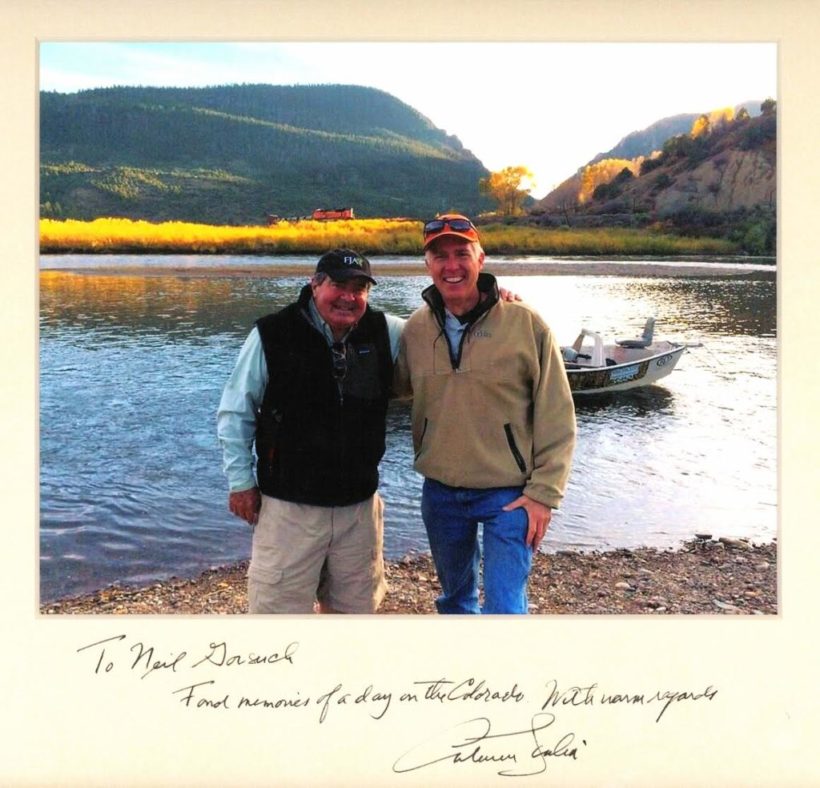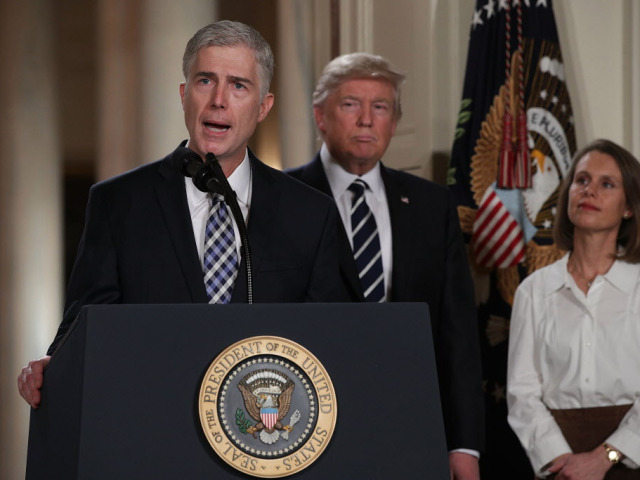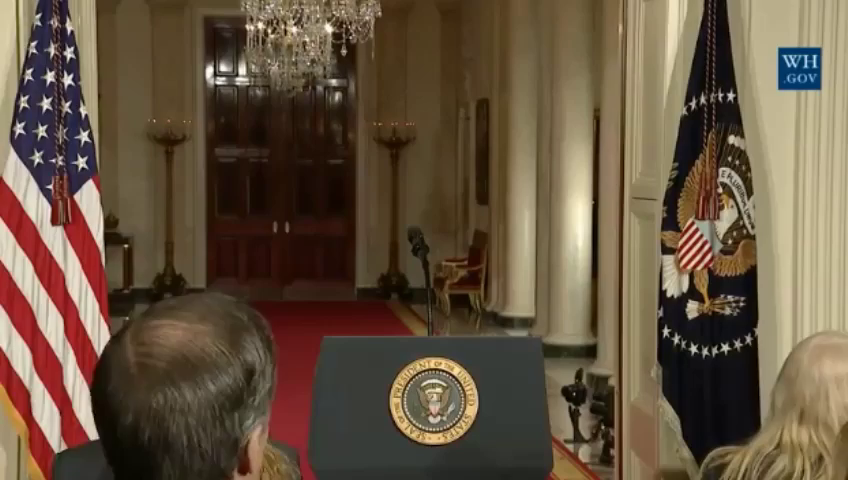
The late Supreme Court Justice Antonin Scalia (left) on a flyfishng trip with Judge Neil Gorsuch.
redo Jump to...
print Print...
(by Marisa Schultz and Bob Fredericks, NY Post) – President Trump nominated Judge Neil Gorsuch of Denver to the Supreme Court on Tuesday — a move Democrats vowed to fight even before his name was announced.
“I took the task of this nomination very seriously,” Trump said as he introduced the nominee and his wife, Louise, in an announcement at the White House. “Judge Gorsuch has outstanding legal skills. The qualifications of Judge Gorsuch are beyond dispute.”
Gorsuch took the podium and talked emotionally about how he missed the justice he would be replacing, the late Antonin Scalia.
“I pledge that if I am confirmed,” he said, “I will be a faithful servant to the Constitution and laws of this country.”
Gorsuch, 49, a fourth-generation Coloradan who sits on the US Court of Appeals for the 10th Circuit in Denver, will restore the ideological balance that existed before Scalia’s sudden death in February 2016 left a gaping vacancy. [Gorsuch has praised the late Justice Antonin Scalia’s dedication to “textualism [originalism],” or the interpretation of laws based on the actual text rather than trying to decipher the “intent” of lawmakers or other potential consequences.
Gorsuch has been described as a constitutionalist who adheres to “originalism (also known as textualism)” when interpreting the U.S. Constitution.

Judge Neil Gorsuch (L) speaks to the crowd as his wife Louise looks on after U.S. President Donald Trump nominated him to the Supreme Court during a ceremony in the East Room of the White House January 31, 2017.
…Gorsuch has also routinely ruled in favor of religious liberty, as Business Insider noted — siding with Hobby Lobby and Little Sisters of the Poor who said Obamacare’s contraceptive mandate violated their religion because it required them to pay for abortifacients like the Morning After pill. He wrote that federal courts should give strong consideration to religious beliefs: “It is not for secular courts to rewrite the religious complaint of a faithful adherent, or to decide whether a religious teaching about complicity imposes ‘too much’ moral disapproval on those only ‘indirectly’ assisting wrongful conduct,” he noted in a concurring opinion.]
The Harvard grad is a conservative Republican and a champion of religious liberty known for his [easy to understand] writing style.
Gorsuch has written against euthanasia and assisted suicide, the latter of which Colorado legalized last November. “All human beings are intrinsically valuable and the intentional taking of human life by private persons is always wrong,” he wrote in his 2006 book “The Future of Assisted Suicide and Euthanasia.”
Gorsuch attended Columbia, Harvard Law School and Oxford, and he was a partner with the Washington law firm Kellogg Huber Hansen Todd Evans & Fige. He also clerked for Supreme Court Justices Byron White and Anthony Kennedy.
The Senate unanimously voted to confirm Gorsuch to the 10th Circuit Court of Appeals in 2006.
In a 2005 article in the conservative National Review, Gorsuch argued that “American liberals have become addicted to the courtroom, relying on judges and lawyers rather than elected leaders and the ballot box, as the primary means of effecting their social agenda.”
A study led by Mercer University law professor Jeremy Kidd concluded that Gorsuch was the second-most similar to Scalia of the 21 prospective justices on a list Trump released during the presidential campaign.
Gorsuch will face tough grilling from Democrats on the Judiciary Committee and, surviving that, when the full Senate votes on his nomination.
Sen. Jeff Merkley (D-Ore.) vowed to stage a filibuster on the Senate floor even before the pick was announced. …..
Republicans hope an announcement this week on the Supreme Court choice will provide time for confirmation before the Senate recess scheduled to start April 8, and potentially let the new justice hear cases during the high court’s current nine-month term.
Democrats will be hard-pressed to stop the nomination given the 52-48 advantage Republicans hold in the Senate.
Under current rules, Republicans need 60 votes to bring the nomination to the Senate floor if the filibuster proceeds. But Republicans could eliminate the filibuster for Supreme Court appointments with a simple majority vote — invoking the so-called “nuclear option.”
Senate Majority Leader Mitch McConnell (R-Ky.) has vowed lawmakers will confirm Trump’s nominee.
The political leanings of the court nominee are of vital importance to both Democrats and Republicans, as the new court could decide cases affecting controversial issues such as immigration, voting rights, abortion, affirmative action and transgender rights.
“It’s really important we have a mainstream nominee, and the way to do that is to require a super-majority vote, as we have now,” Sen. Debbie Stabenow (D-Mich.) said Monday. [By mainstream Sen. Stabenow means a judge who practices the liberal belief practice of judicial activism (ruling based on what a judge feels the law should be).]
Democrats are still angry that Senate Republicans refused to consider President Obama’s nomination of Judge Merrick Garland to fill the Scalia seat, despite the fact that Justice Scalia passed away just months before the election. If a Repubican president had been in office, Senate Democrats would also have refused to consider a nominee.
President Obama chose two Supreme Court justices during his tenure. This nomination could possibly be one of several for Trump. Three other justices — Ruth Bader Ginsburg, Anthony Kennedy and Stephen Breyer — are at least 78.
Questions
1. In a televised announcement on Tuesday night, President Trump introduced Judge Neil Gorsuch of Denver as his nominee for U.S. Supreme Court Justice. List Judge Gorsuch’s qualifications/experience.
2. a) What type of judicial philosophy does Judge Gorsuch adhere to?
b) What did he say about judges in a speech at Case Western Reserve University’s law school?
3. What was the outcome of the 2006 Senate vote on Gorsuch’s nomination for the US Court of Appeals for the 10th Circuit in Denver?
4. How did Judge Gorsuch explain his support for Hobby Lobby and Little Sisters of the Poor when they challenged Obamacare’s contraceptive mandate because it required them to pay for the Morning After pill (an abortifacient)?
5. What did Judge Gorsuch write in a book about Euthanasia?
6. There are two types of judges: activist and originalist/textualist. Progressives (liberals) generally support the nomination of activist judges and conservatives generally support the nomination of originalist judges.
- Judicial activism is “the act of replacing an impartial interpretation of existing law with the judge’s personal feelings about what the law should be.” Judicial activism is used to describe judges who seek to enact legislation through court rulings. (wikipedia)
- A constitutionalist/originalist “refers to those who advocate strict adherence to the intentions of the framers of the U.S. Constitution” – they rule based on what the law says, not what they want it to be (wikipedia)
a) Judge Gorsuch is an originalist. He makes his decisions in a case on what the law says. Do you support the nomination of activist or originalist judges? Explain your answer.
b) Regardless of your political party, should the opposing party try to delay or thwart the nomination of a qualified nominee just because he/she is an activist judge or an originalist? Explain your answer.
7. Watch the press conference with President Trump introducing Judge Gorsuch as his nominee for U.S. Supreme Court and Gorsuch’s following remarks. What do you think of introducing Judge Gorsuch to the American people – of going directly to the people with this nominee? (helpful, successful, efficient, modern, not appropriate, …) Explain your answer.
(Consider this: President Trump tweets updates daily. He also comments in real time. President Obama’s White House was the first presidency to make use of social media: Twitter, Facebook, Snapchat, and Instagram. President Obama has been called the “first social-media president.” Is this a good way for presidents to communicate with the American people today? Explain your answer.)
Background
PROCEDURE FOR NOMINATING AND CONFIRMING FEDERAL AND SUPREME COURT JUDGES:
- The President nominates a person, and sends the name to the Senate Judiciary Committee
- The nominee is questioned by the Senate Judiciary Committee (confirmation hearings).
- If confirmed, the name goes to the Senate for a vote.
- If the full Senate votes to confirm a nominee by 51 votes (a simple majority) or more, the nominee is confirmed.
On the Role of Judges:
Judges are like umpires in baseball or referees in football or basketball. Their role is to see that the rules of court procedures are followed by both sides. Like the ump, they call ‘em as they see ‘em, according to the facts and law-without regard to which side is popular (no home field advantage), without regard to who is “favored,” without regard for what the spectators want, and without regard to whether the judge agrees with the law. (from the American Bar Asociation)
“The role of a judge is to be a neutral interpreter of already established law, not legislator of new law or social policy. A judge can have his or her own opinions, even strong ones, and still read the law neutrally. Fundamentally, judges are expected to not bring their personal politics and philosophies to the bench. Judges are expected to read the law in its clear intent and apply it without regard to result. Changing the law should be left to the people and their legislators.” Sean Rushton, Committee for Justice Executive Director, from the WashingtonPost .com.
“One of the big confusions in the…Senate fight over the confirmation of judicial nominees is that this is an issue about ‘liberal’ judges versus ‘conservative’ judges. The vastly more important issue is whether people who go into court should expect their cases to be decided on the basis of the law [textualist/constitutionalist/constructionist] or on the basis of the particular judge’s own philosophy [activist judges] …Liberals have rooted for judicial activism because this activism has favored liberal causes and liberal views on such issues as abortion, the death penalty, gay marriage, and racial quotas. But activism can be used by any judge for any purpose.” Thomas Sowell, Hoover Institution
NOTE: …It is crucial…to have a president who understands the judiciary’s proper role. As Ronald Reagan once noted, “[The Founders] knew that the courts, like the Constitution itself, must not be liberal or conservative.” For Reagan and for the Founders, judges were to be selected based on their ability to put political preferences aside and interpret the Constitution and laws based on their original meaning. Rather than scrutinizing judicial nominees based on their perceived political leanings, [every] president should appoint judges who apply the law regardless of their own policy preferences. (from “Misunderstanding the Role of Judges” by Deborah O’Malley)
OP-ED: Scalia’s gift to America — saving the Supreme Court
(by the NYPost editorial board, Feb. 14, 2016) – – Justice Antonin Scalia’s sudden death at 79 robs the high court of one of its most important and influential jurists ever.
President Obama’s announced intent to choose Scalia’s successor promises a bitter battle — and a futile one: No Supreme Court nominee has been named and confirmed in a presidential election year since 1940.
Nor should partisan rancor overshadow the record Scalia built in three decades on the high court, whose fundamental outlook he helped redefine through his brilliant mind, pointed wit and zest for intellectual combat.
A Jersey native who grew up in Elmhurst, Queens, Scalia was already the leader of the fight against judicial activism when he became the first Italian-American justice.
Indeed, as Elena Kagan said long before she joined the high court, Scalia “really transformed the terms of legal debate in this country. He is the justice who has had the most important impact over the years on how we think and talk about law.”
Scalia was the most eloquent and passionate advocate of “original understanding” — the notion that judges should decide a law’s constitutionality by its actual words, not the “intent” behind it or the needs of society:
“It is not supposed to be our judgment as to what is the socially desirable answer to all of these questions,” he said. “That’s supposed to be the judgment of Congress.”
Indeed, he wrote in one of his many memorable opinions:
“A system of government that makes the People subordinate to a committee of nine unelected lawyers does not deserve to be called a democracy.”
He believed not in a “living” Constitution, subject to “the passions of the moment that may cause individual liberties to be disregarded,” but an “enduring” one, dedicated to federalism and the separation of powers.
Which is why, though a strong social conservative, he argued that Constitution neither guarantees the right to an abortion nor precludes the states from allowing it.
This divide over the purpose of judicial power is the main reason confirmation fights have become circuses. Scalia was confirmed unanimously — which would never happen today.
In his remarkable 30-year tenure, Scalia became the left’s favorite judicial bogeyman. Yet his closest personal relationships on the court were with his two most liberal colleagues, Justices Kagan and Ruth Bader Ginsburg — who once said, “I love him. But sometimes I just want to strangle him.”
Best known for his thunderous dissents, he also penned (at least) his share of than landmark majority opinions. Everything he wrote was eminently quotable.
As Terry Eastland noted in The Weekly Standard a decade ago, Scalia wrote for the long term, aiming to influence the next generation of lawyers. That he most certainly did — and this nation and its rule of law are much the better for it.
==
The nomination came after an extraordinarily contentious day in the nation’s capital, with Democrats still furious over the president’s temporary travel ban on immigrants from seven predominantly Muslim countries.
Fast-moving developments included:
Senate Democrats pulled a procedural maneuver at a Judiciary Committee meeting on Sen. Jeff Sessions (R-Ala.), delaying his expected confirmation as attorney general by at least a day.
Democrats boycotted Finance Committee hearings to consider two key cabinet nominees — Steven Mnuchin at Treasury and Thomas Price at health — claiming each required further vetting.
MoveOn.org and Resist Trump New York organized protests targeting Senate Democratic Leader Charles Schumer dubbed “What the f-ck, Chuck?”
About 250 people gathered outside Schumer’s Midtown office in the afternoon, and a larger demonstration in the evening at Grand Army Plaza in Brooklyn was headed to his Prospect Park home.
Schumer led the effort to delay a vote on Sessions using a procedural trick known as the “2-hour rule,” which bars Senate committee meetings from continuing past 2 p.m.
Democrats on the committee gave lengthy speeches, with Sen. Mazie Hirono (D-Hawaii) dragging out the clock for 23 minutes, in part by reciting a speech by former President Ronald Reagan.
Schumer announced his intentions on Twitter — mid-hearing — at 1:21 pm: “The American people need answers on exec orders from Sen. Sessions. Jud Cmte shouldn’t proceed until we get them so I’ll invoke the 2hr rule.”
Judiciary Committee chair Sen. Chuck Grassley — who gave Democrats the leeway to vent — said the vote would be delayed until 10:30 a.m. Wednesday once he learned Schumer had invoked the maneuver.
As Democrats fought to delay hearings on Trump’s cabinet picks, the White House and GOP senators fought back furiously.
Administration spokesman Sean Spicer angrily called the delay tactics “ridiculous.”
“The mere idea they’re not even showing up to hearings is truly outrageous,” he said.
Finance Committee chair Orrin Hatch (R-Utah) went further.
“They ought to stop posturing and acting like idiots,” he griped. “I’m very disappointed in this kind of crap. This is the most pathetic thing I’ve seen in my whole life in the United States Senate.”
The Democratic walkout stalled deliberations because Finance Committee rules require at least one Democrat to be present for votes.
Sen. Patrick J. Toomey (R-Pa.) said the move was unprecedented: “We did not inflict this kind of obstructionism on President Obama,” he said.
But in 2013, when Democrats controlled the Senate, Republicans boycotted a committee vote on Gina McCarthy to head the Environmental Protection Agency, temporarily stalling it.
Trump, the former star of “The Apprentice,” had summoned Gorsuch and his other top finalist, Thomas Hardiman, 49, of Pittsburgh, to appear in DC, setting up a dramatic reality-TV-like reveal of the winner.
Resources
Watch President Trump’s introduction of Neil Gorsuch, televised live at 8 p.m. on Tuesday, January 31.
Daily “Answers” emails are provided for Daily News Articles, Tuesday’s World Events and Friday’s News Quiz.




